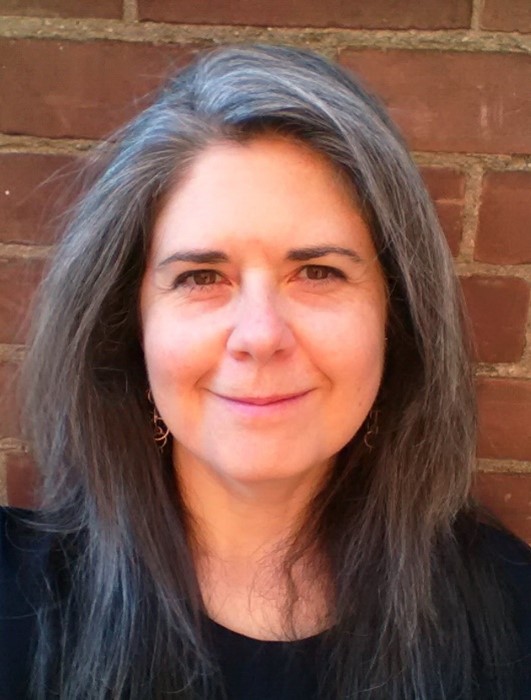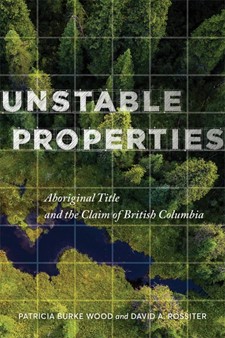
York University’s Faculty of Environmental & Urban Change (EUC) is celebrating the launch of Professor Patricia Wood’s latest book Unstable Properties: Aboriginal Title and the Claim of British Columbia (UBC Press, 2022).

Wood celebrates this accomplishment alongside her co-author, David Rossiter, professor at Western Washington University and a York Geography alumnus.
The Faculty invites the York community and beyond to attend the book launch event on Monday, May 1 from 10:30 a.m. to noon in HNES 138. The event will also be broadcast on Zoom; for a zoom link contact Denise McLeod.
Wood will be joined by Assistant Professor Martha Stiegman and Matthew Farish, of the University of Toronto’s Department of Geography and Planning, who will discuss the book’s arguments and contributions. The moderator for the discussion will be Leora Gansworth, York geography PhD alumna and Provost’s Postdoctoral Fellow at Osgoode Hall Law School.
As a precursor to the event, Wood met with graduate student researcher Danielle Legault to answer several questions about the new book.
Q: How does this book build on your previous research work, and what inspired you to write it?
A: David Rossiter and I have been researching the historical, political and legal geography of Indigenous title in B.C. for about 20 years. It started with a project on the referendum that the provincial government, under (former) Premier Gordon Campbell, held in 2002 about the “principles” of treaty negotiations. That became our first published article together, in The Canadian Geographer, in 2005. Several more articles, presentations and op-ed pieces followed on specific aspects, but there was a larger story that we wanted to tell that needed a book-length manuscript to do properly.
Q: What inspired your choice of British Columbia as the site of exploration in this book?
A: British Columbia is an important site of Indigenous-settler relations because the vast majority of the territory the Crown claimed was never “conquered” nor ceded by treaty. The Crown’s claim, even according to its own law, is without solid moral or legal foundation. It is thus inherently unstable.
Q: Can you discuss the unique approach of Unstable Properties in reframing the topic of Aboriginal claims to Crown land?

A: We would emphasize that the question is one of Crown claims on Indigenous land, not the other way around. This is at the heart of our approach. It has always been the Indigenous claim that is subjected to scrutiny, as a “burden” on the Crown claim. This is backwards; it is the legitimacy of the Crown’s claim that needs to be examined. It is Canada that needs to reconcile its actual history and present with its alleged principles of democracy and justice.
We also want to emphasize that what progress has been made on resolving these questions and moving forward towards a more just relationship should be credited to Indigenous individuals and organizations who did the political and legal work to compel the Canadian state to – start to – recognize the hypocrisy, injustice and violence of settler-colonial land claims.
Our argument about the instability of the settler claim to Indigenous land in British Columbia isn’t intended to suggest British Columbia is exceptional and everywhere else is fine, but rather that it exposes the problems of settler-colonial claims across Canada, and should lead us to question what existing treaties mean, under what circumstances they were established, and what kind of relationship we want to pursue from here.
Research is not politically neutral, and a lot of talk about “reconciliation” can be pretty superficial. We’re trying to contribute to a path that is more meaningful and material, where Indigenous sovereignty and land rights are part of the plan. Facing our history and decolonizing our thinking is not just in our publications; bringing this to the curriculum and the classroom is just as important.
Q: Having completed this book, how do you see your work moving forward in the future?
A: We know we still have miles to go, and Dave and I plan to continue to pay attention to specific cases that Indigenous organizations raise to see where we can help with research that exposes the instability of the settler claim, in hopes that it helps pressure settler governments to come to the table and negotiate honestly and fairly.
About the authors
Wood is a professor at the York University’s Faculty of Environmental & Urban Change. Currently, Wood is a visiting scholar in the Department of Geography and the Indo-Canadian Studies Centre at the University of Mumbai. Her research addresses topics of Indigenous sovereignty and settler colonialism, political ecology and citizenship and governance. Rossiter is a professor in the College of Environment at Western Washington University. He completed MA and PhD degrees in the graduate program in geography at York University.
